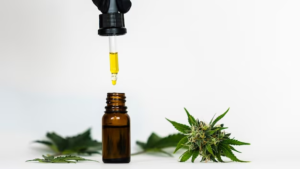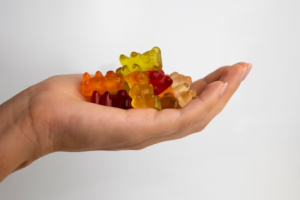
CBD (Cannabidiol) is an organic compound extracted from the hemp plant, known for interacting with the endocannabinoid system present not just in humans, but also in animals. This interaction offers potential therapeutic effects, including anxiety reduction, pain relief, and overall wellness enhancement.
CBD formulations in the pet industry typically utilize either full-spectrum or broad-spectrum hemp extracts. While full-spectrum encompasses all cannabinoids and terpenes present in hemp, including a trace amount of THC, broad-spectrum extracts maintain the rich profile minus the THC.
Potential Advantages of CBD for Dogs
CBD’s remarkable properties arise from its alliance with the endocannabinoid system. These encompass:
- Anxiety Relief: Various triggers, from loud noises to routine shifts, can induce anxiety in dogs. CBD promotes tranquility, mitigating these stressors.
- Pain Management: Leveraging CBD’s anti-inflammatory attributes can aid in addressing conditions like arthritis, facilitating better mobility.
- Focus and Relaxation: CBD can potentially foster a calm mindset, aiding dogs in remaining attentive during tasks.
- Holistic Wellness: By engaging with the endocannabinoid system, CBD fosters a balanced state, enhancing overall health.
However, individual responses to CBD can differ. It’s paramount to ascertain the optimal dosage, preferably after consulting with a veterinarian.
Deciphering the Right CBD Dosage for Dogs
Embarking on the CBD journey requires diligence in selecting the right product, taking into account dosage recommendations, product format, and your dog’s preferences.
- Dosage Guidelines: CBD strength varies, and ensuring your dog receives the correct amount is crucial. It’s advisable to approximate the required CBD milligrams based on your dog’s weight, selecting products that simplify this process. For instance, products should clearly specify CBD content per serving.
- Routine Considerations: Choose between oils and chews based on your daily routine and your pet’s likings. Both formats have their advantages, with oils offering precise dosing and chews being convenient for on-the-move scenarios.
- Product Trustworthiness: With the pet CBD market still maturing, selecting from transparent, reputable brands is vital. Prioritize ingredient clarity, specific pet formulations, and reliable customer feedback.
For those new to CBD, starting with a standard 2mg per 10 lbs of your dog’s weight is advised. This dosage can be adjusted based on observations of your dog’s response.
Administering CBD Effectively to Your Dog
Introducing CBD to your dog can be seamless when armed with the right knowledge.
- Optimal Timing: For maximal effect, provide CBD around 20 minutes before meals.
- Method of Administration: Depending on your dog’s preference, you might opt for CBD treats or oils. While treats are often readily accepted, oils can be mixed with enticing foods for the more finicky eaters.
CBD Dosage Table for Dogs
| Dog Size | Approximate Weight | Recommended Starting Dosage |
| Small | 10 lbs | 2mg CBD |
| Medium | 20 lbs | 4mg CBD |
| Large | 50+ lbs | 10mg+ CBD |

Product-Specific Recommendations
- Wisely High Potency Hemp CBD Oil: 3 drops = 1 mg CBD. For a 10lb pet: 3 drops for a low dose, 9 drops for a medium dose, and 15 drops for a strong dose.
- Wisely Extra High Potency Hemp CBD Oil: 1 drop = 1 mg CBD. For a 20lb pet: 2 drops (low), 6 drops (medium), and 10 drops (strong).
The dosage pattern follows suit for other products, adjusting for the specific CBD concentration in each.
Administering
- CBD can be dropped directly into the pet’s mouth or can be added to food, treats, or pill pockets.
- Some products, like the Wisely Coconut Oil with CBD, can be added to food or applied directly on the pet’s skin.
Choosing a Product
- Wisely Pet’s hemp CBD products are highlighted as both high quality and affordable. Different products have different concentrations of CBD, so choosing the right one for your pet’s weight and needs is crucial.
- The product choice also depends on the pet’s weight, with some products better suited for pets under 20 pounds, and others better for larger pets.
Safety and Monitoring
- Always monitor your pet’s response after administering CBD.
- If any adverse reactions occur, stop the treatment and consult with a vet.
- It’s essential to make sure the CBD product you’re using is free from harmful additives and has been third-party lab tested.
Understanding CBD and Its Effects on Dogs
Cannabidiol (CBD) has rapidly gained attention in the world of pet health, with many owners reporting improved well-being and temperament in their furry companions. CBD is a non-psychoactive compound found in cannabis and hemp plants and is known for its potential therapeutic benefits in humans. But what about dogs?
Scientifically, dogs have an endocannabinoid system, similar to humans. This system plays a vital role in maintaining physiological processes such as mood, pain, and appetite. CBD interacts with this system, potentially offering benefits like pain relief, anxiety reduction, and anti-inflammatory effects. However, while preliminary studies and anecdotal evidence seem promising, comprehensive research on CBD’s effects on dogs is still in its infancy.
Dosage is crucial. Just as humans can experience adverse effects from taking too much of a substance, so can dogs. Therefore, understanding the appropriate amount to administer is paramount for your pet’s safety.
Determining the Right Dosage for Your Dog
When considering CBD for your dog, determining the right dosage is essential. Unlike human medications, dosing for pets depends on several factors, including weight, age, breed, and the specific ailment you’re addressing.
As a starting point, many veterinarians and CBD experts suggest a dosage of 1-2 mg of CBD per 10 pounds of your dog’s weight. For instance, if your dog weighs 30 pounds, a safe starting dose might be between 3-6 mg. However, this is a general guideline, and you should always start with a lower dose and observe your pet’s reaction before adjusting.
Bear in mind that the form of CBD matters. Oils, treats, and capsules can have different concentrations of CBD. Always read the label carefully and consult with a veterinarian before introducing any new supplement into your pet’s diet.
The Science Behind CBD for Dogs
CBD’s impact on the canine body is an intriguing area of research, primarily because of the numerous positive testimonials from pet owners. The endocannabinoid system, a network of receptors present in mammals, plays a pivotal role in this. When CBD enters a dog’s body, it interacts with this system, potentially enhancing its functionality.
Preliminary studies suggest that akin to humans, dogs can also benefit from CBD’s ability to mitigate inflammation, reduce anxiety, and promote overall wellness. However, scientific investigations are ongoing, and while current results are promising, more research is needed to establish definitive effects.
A Closer Look at CBD Products for Dogs
When venturing into the world of CBD for dogs, you’ll encounter various products ranging from oils, chews, and balms, to even shampoos.
- CBD Oils: These are the most popular. They can be administered directly or mixed with food. The benefit of oils is the precision in dosing.
- CBD Chews/Treats: These are convenient and often flavored, making them a favorite among pets. They come in different strengths, so ensure you’re giving the right amount.
- CBD Balms: Useful for external applications, these are suitable for dogs with skin issues or localized pain.
- CBD Shampoos: These can promote skin health and alleviate issues like itching or dandruff.
Always select products designed for pets, as they are formulated considering their specific needs and safety.
Factors Influencing CBD Dosage in Dogs
Different dogs might react differently to the same CBD dosage. Factors influencing this include:
- Age: Older dogs might have a more pronounced reaction to CBD, necessitating lower doses.
- Health Condition: Dogs with severe health issues might require a different dose than those with minor ailments.
- Activity Level: Active dogs might metabolize CBD faster than less active ones.
- CBD Product Quality: High-quality products might deliver better results at lower doses.
Overcoming Common CBD Myths
With CBD’s rise in popularity come various myths. It’s essential to debunk these for a clearer understanding.
- “CBD is a miracle cure”: While CBD has potential benefits, it isn’t a cure-all. Regular vet consultations are crucial.
- “All CBD products are the same”: Quality varies. Always prioritize third-party tested, high-quality products.
- “More CBD is better”: Not necessarily. It’s about finding the right dose, not the highest one.
Long-Term Use of CBD in Dogs
Considering CBD for long-term use? It’s vital to monitor your dog continually. While no significant side effects have been reported with extended CBD use in dogs, individual reactions can vary. Periodic vet check-ups can help ensure your pet remains in optimal health while benefiting from CBD.
Combining CBD with Other Medications
If your dog is on other medications, consult your veterinarian before introducing CBD. While CBD is generally considered safe, it can interact with some drugs, altering their efficacy.
Storing CBD Products
To maintain the efficacy of CBD products:
- Store them in a cool, dark place.
- Avoid direct sunlight.
- Keep away from children and other pets.
Conclusion
CBD’s rise in popularity among pet owners is undeniable, driven by its potential to offer relief from various ailments. However, as with any supplement, responsible use is essential. Always ensure that the product you’re using is specifically formulated for pets, free from harmful additives, and has undergone third-party testing. The key to a positive CBD experience for your dog lies in research, understanding, and close monitoring.
FAQ
1. Can my dog get “high” from CBD?
No, CBD is non-psychoactive, meaning it won’t produce a “high” like THC, another compound found in cannabis plants. Ensure the CBD product you’re using has minimal to no THC.
2. Are there side effects of giving CBD to my dog?
As with any supplement, potential side effects may occur. These can include drowsiness, dry mouth, or lowered blood pressure. Always monitor your dog closely after administering CBD.
3. Can I give my dog human CBD oil?
It’s recommended to use products specifically formulated for pets. Human CBD products might contain ingredients that are not safe for dogs.
4. How often should I give my dog CBD?
This depends on the ailment you’re addressing and the product you’re using. Consult with a veterinarian for a precise recommendation.





